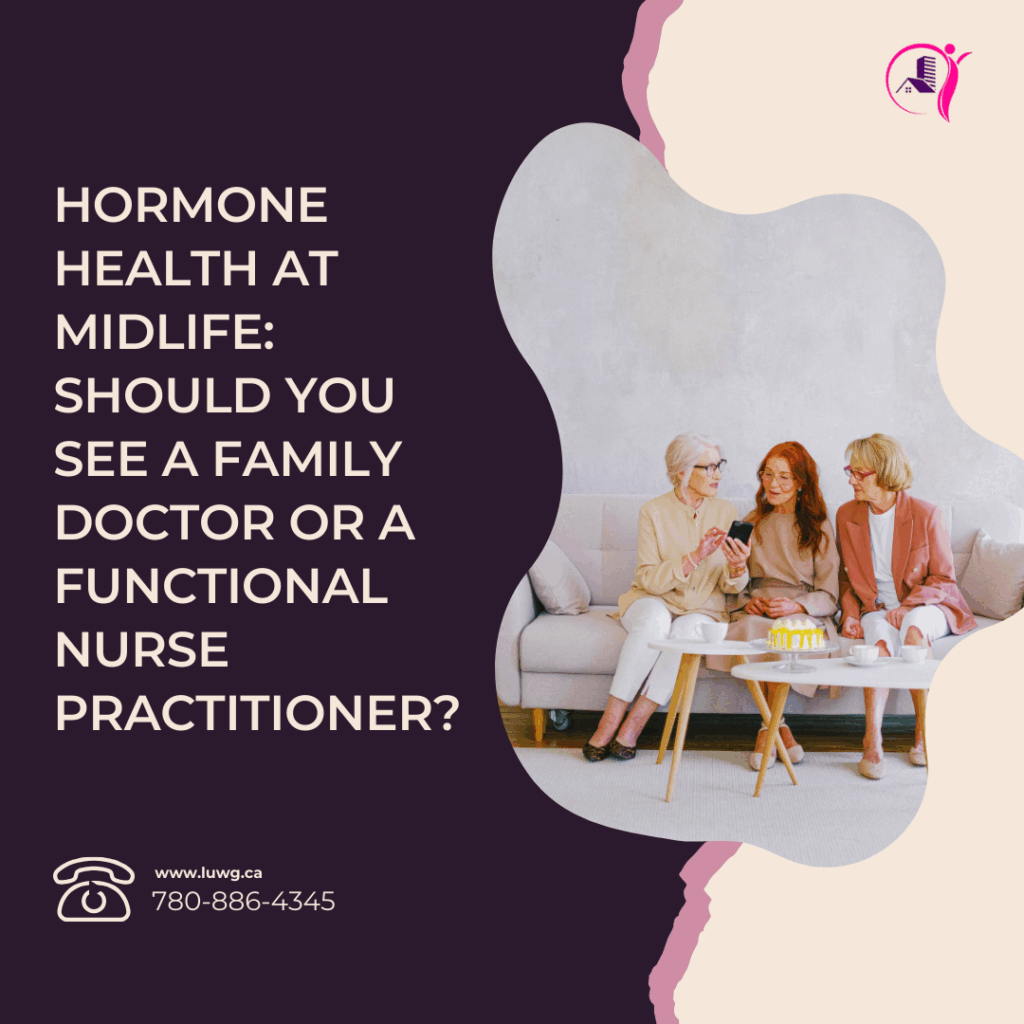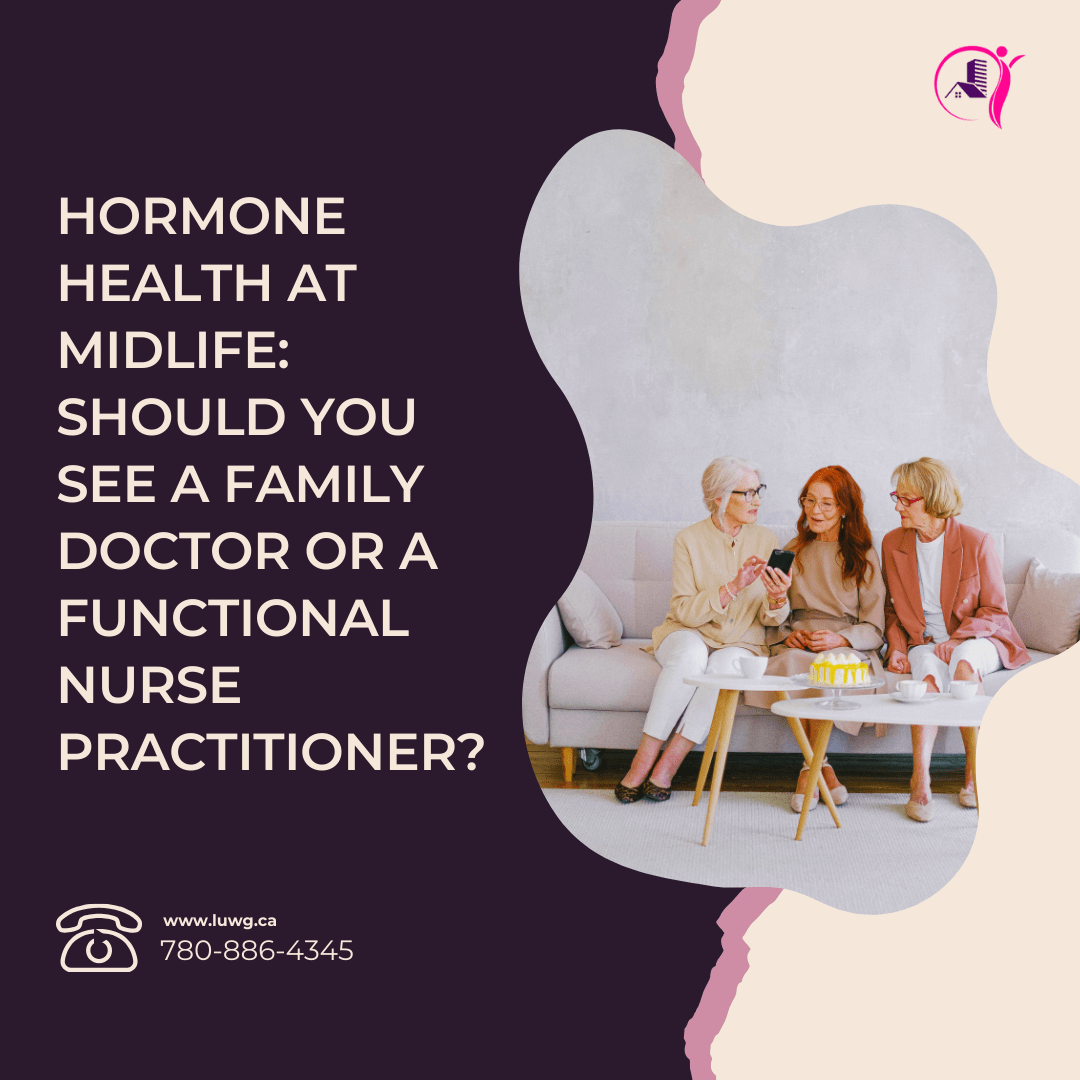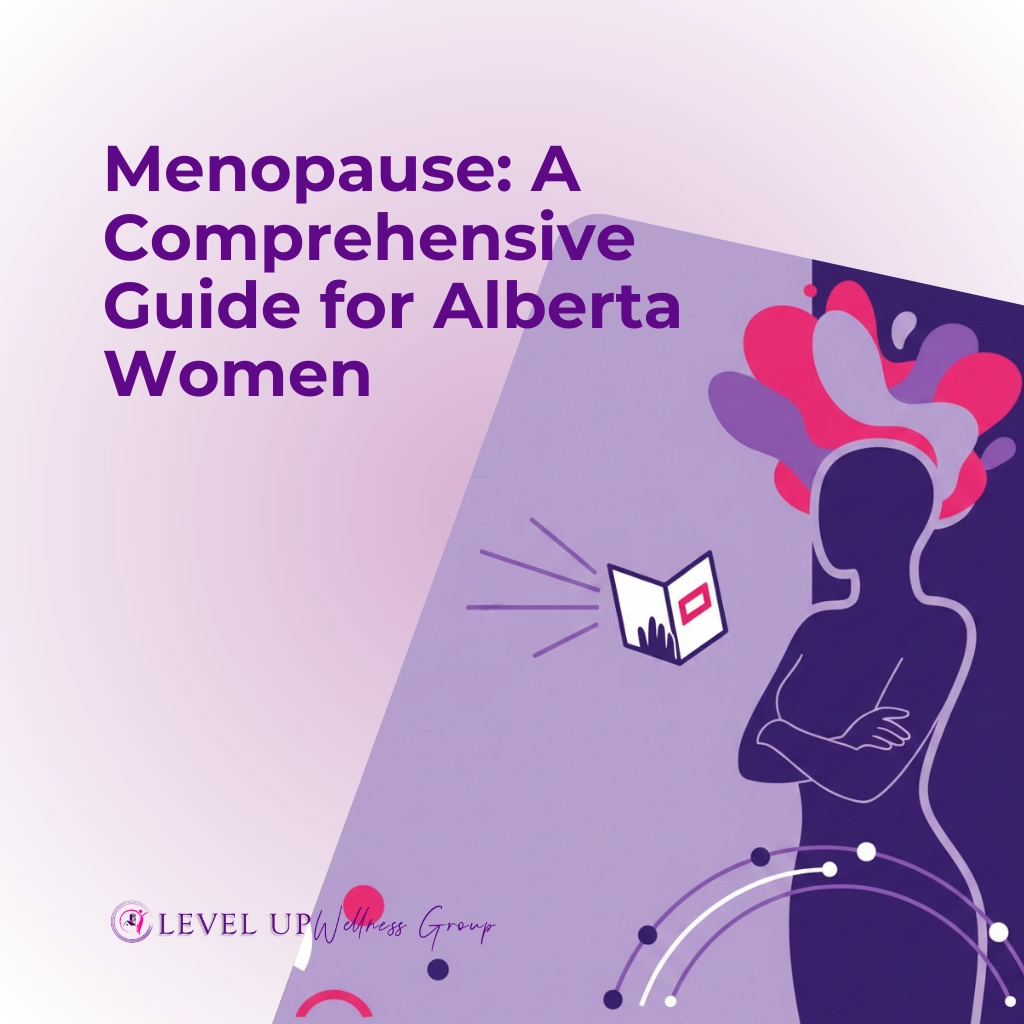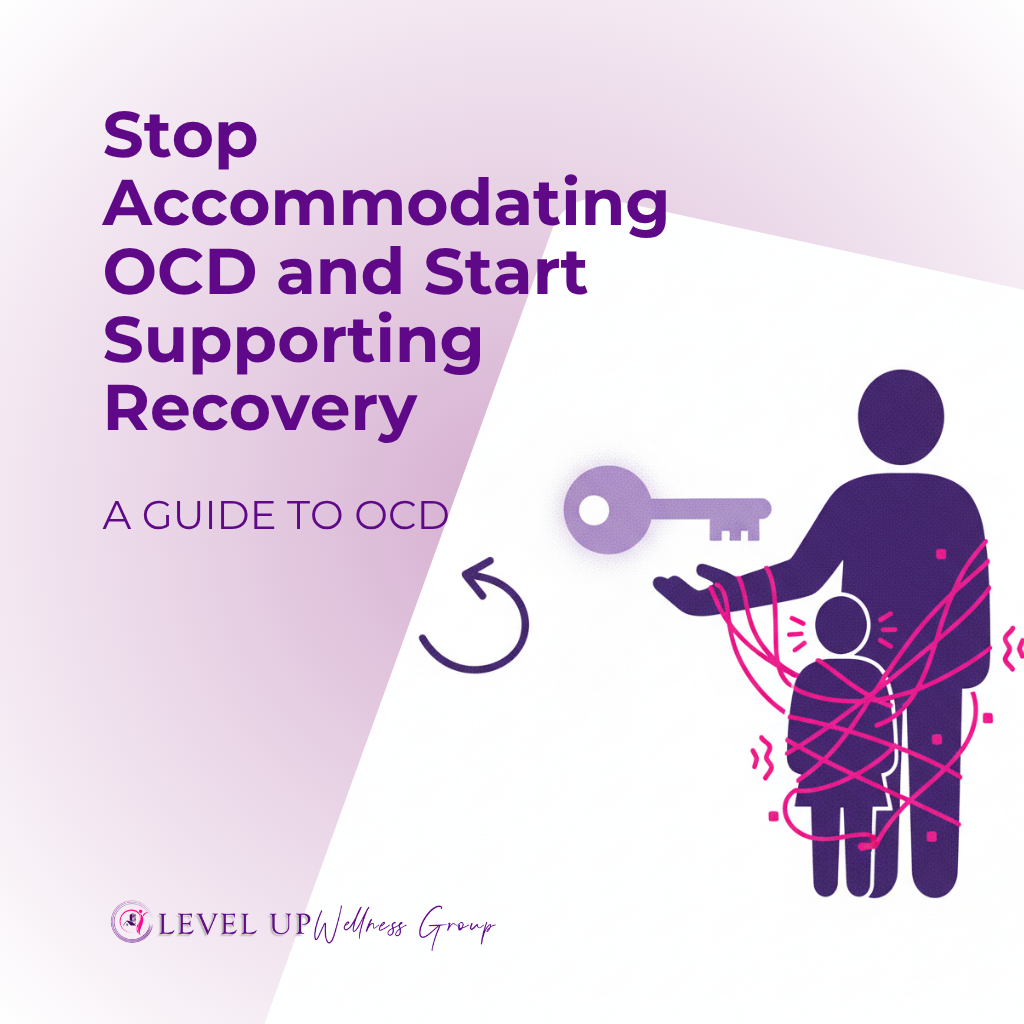
As women approach perimenopause and menopause, the hormonal changes they experience can lead to a wide range of physical and emotional symptoms—hot flashes, poor sleep, mood swings, brain fog, and more. It’s a time when many seek medical support, but navigating who to see can be confusing. Should you book with your family doctor (GP), or work with a functional nurse practitioner (FNP) who specializes in hormonal care?
At Level Up Wellness Group (LUWG), we support women across Alberta, BC, and Ontario through this life transition. This blog helps you understand the differences based on up-to-date clinical research so you can make the best decision for your body and your goals.
The Role of Family Doctors (GPs) in Menopause Care
Family doctors (GPs) play a crucial role in managing perimenopause and menopause. They follow nationally and provincially recommended guidelines, including Ontario’s 2025 Menopause Quality Standard, which supports menopausal hormone therapy (MHT) as the first-line treatment for women experiencing moderate to severe vasomotor symptoms such as hot flashes and night sweats.
MHT has been shown in large, long-term studies like the Women’s Health Initiative (WHI) and more recent reviews (BMJ 2023, Climacteric 2024) to significantly improve quality of life and bone health when started before age 60 or within 10 years of menopause.
GPs typically order standard blood tests like estradiol, FSH, TSH, and cholesterol and assess your suitability for hormone therapy based on age, cardiovascular history, family cancer risk, and other factors. They can also prescribe non-hormonal alternatives such as SSRIs or gabapentin when needed.
While the conventional approach is effective and safe, GP appointments are often short, and there may be limited opportunity to explore deeper causes of symptoms or to integrate lifestyle or nutritional strategies.

The Functional Nurse Practitioner (FNP) Approach
In contrast, a functional nurse practitioner (FNP) offers a more holistic, personalized approach to hormonal health. Rooted in functional medicine, this model looks at the “whole person” not just hormone levels, but stress, diet, sleep, gut health, and even environmental exposures.
FNPs often order a broader range of lab tests, including cortisol, DHEA, insulin resistance markers, inflammatory markers, thyroid panels, and nutrient levels. Rather than relying solely on conventional “normal ranges,” they may use optimal functional ranges to detect early imbalances.
For treatment, functional NPs frequently use bioidentical hormone replacement therapy (BHRT) plant-derived hormones designed to mimic the body’s own. While some forms of BHRT are approved by Health Canada, compounded versions are not regulated or standardized, and large medical organizations such as the North American Menopause Society (NAMS) and the American College of Obstetricians and Gynecologists (ACOG) recommend caution due to limited data on long-term safety and effectiveness.
Nurse-Led Menopause Care: What the Research Shows
That said, recent studies highlight the value of nurse-led menopause care. A 2023 Canadian study found that patients treated by trained nurse practitioners in menopause clinics showed significant improvement in 19 out of 20 menopause symptoms, using the Greene Climacteric Scale.
These results support the effectiveness of FNPs when they follow evidence-based practices and monitor treatment closely. Many patients appreciate that FNPs offer longer appointments, more in-depth lab reviews, and support with supplements, lifestyle changes, and dietary coaching.
For example, functional NPs may recommend vitamin D and K2 for bone health, omega-3 fatty acids for cardiovascular support, magnesium for sleep and mood, and adaptogenic herbs like black cohosh or ashwagandha for symptom relief. While some of these approaches lack large randomized controlled trials, they are supported by smaller clinical studies and have a strong track record in integrative care.

Access and Regulation in Canada
In terms of access and regulation, both GPs and NPs in Alberta, British Columbia, and Ontario can prescribe hormone therapies, including BHRT (within their scope and training). You do not need a referral to see a functional NP. The decision often comes down to what type of support you’re looking for.
If you want a quick, guideline-based hormone prescription with well-established safety monitoring, a GP may be your best first step. If you’re seeking a root-cause approach that addresses more than just hormone levels—looking at stress, diet, sleep, and gut health—a functional NP could be a better fit.
Some women choose to combine both but with the healthcare crisis, nurse practitioners are playing a vital role in in-depth healthcare.
What Is a Certified Hormone Specialist in Canada — and Why Choose One?
In Canada, a certified hormone specialist is typically a licensed health professional—such as a nurse practitioner (NP), naturopathic doctor (ND), or physician—who has completed advanced, focused training in hormonal health. This training often covers areas like perimenopause, menopause, thyroid function, adrenal health, and bioidentical hormone therapy (BHRT).
While the title “certified hormone specialist” is not a protected designation under Canadian law (like “endocrinologist” or “OB/GYN”), many hormone specialists pursue additional credentials through programs like:
- The Institute for Functional Medicine (IFM)
- The Academy of Preventive and Innovative Medicine
- The Canadian College of Naturopathic Medicine (CCNM)
- Various North American menopause certification programs for NPs and MDs
- Continuing medical education (CME) courses in bioidentical hormone replacement therapy and integrative endocrinology
How Hormone Specialists Work With Patients
These providers use their specialized training to take a whole-person approach to hormone care. Instead of only addressing symptoms like hot flashes or sleep trouble, a certified hormone specialist will evaluate underlying causes, such as insulin resistance, chronic stress, thyroid dysfunction, micronutrient deficiencies, or environmental hormone disruptors.
They often offer longer consultations, in-depth hormone and metabolic testing, and comprehensive treatment plans that may include nutrition, supplements, lifestyle coaching, and bioidentical hormones sometimes compounded for individual needs.
Why Choose a Hormone Specialist Over a GP?
While family doctors (GPs) are highly skilled at diagnosing and managing menopause-related symptoms using evidence-based guidelines (such as those from the North American Menopause Society, Health Canada, and the Society of Obstetricians and Gynaecologists of Canada), they often face time constraints, may have limited training in BHRT or integrative nutrition, and may rely more heavily on standard lab tests and conventional pharmaceutical options.
In contrast, a hormone specialist:
- Has dedicated training in hormonal health beyond general practice
- Uses advanced lab testing to assess a broader range of hormones and biological systems
- Offers bioidentical hormone therapy (BHRT) with more personalized dosing (though patients should be aware of regulatory and evidence limitations around compounded hormones)
- Considers the role of nutrition, gut health, adrenal function, and lifestyle factors in hormone balance
- Typically spends more time per patient, allowing for deeper, more personalized care
What Does the Research Say?
Emerging research supports the value of specialized, integrative hormone care. A 2023 Canadian study on nurse practitioner–led menopause care found significant symptom reduction in areas like anxiety, brain fog, and fatigue when care included individualized hormone management and education (Greene Scale, Journal of Advanced Nursing).
Another 2021 review in Integrative Medicine Reports showed that combining BHRT with lifestyle and nutritional interventions improved patient-reported outcomes in perimenopausal women compared to hormone therapy alone.
This means that the ideal provider is someone who is not only trained in hormones but also committed to safe, evidence-based practice—balancing innovation with regulation.
The Bottom Line
If you’re seeking quick access to proven menopause treatment and are comfortable with a conventional approach, your GP may be the right fit. But if you’re looking for deeper investigation, personalized hormone support, nutritional guidance, and a provider who specializes in this phase of life, a certified hormone-focused practitioner can offer powerful, patient-centered solutions.
At Level Up Wellness Group, our hormone specialists are nurse practitioners with advanced training in functional and integrative hormone care. We work collaboratively with you and your primary care team, if needed to help you regain balance, energy, and confidence in midlife and beyond.
In the end, there’s no one-size-fits-all solution. The right provider is the one who understands your goals, respects your values, and can offer you both evidence-based care and the time to be heard. At Level Up Wellness Group, we offer support rooted in the latest research and tailored to you whether that means conventional hormone therapy, functional hormone balancing, or a combination of both. We believe that every woman deserves personalized, compassionate, and science-informed care during this important life stage.
Written by Allie K, Nurse Practitioner at Level Up Wellness Group





